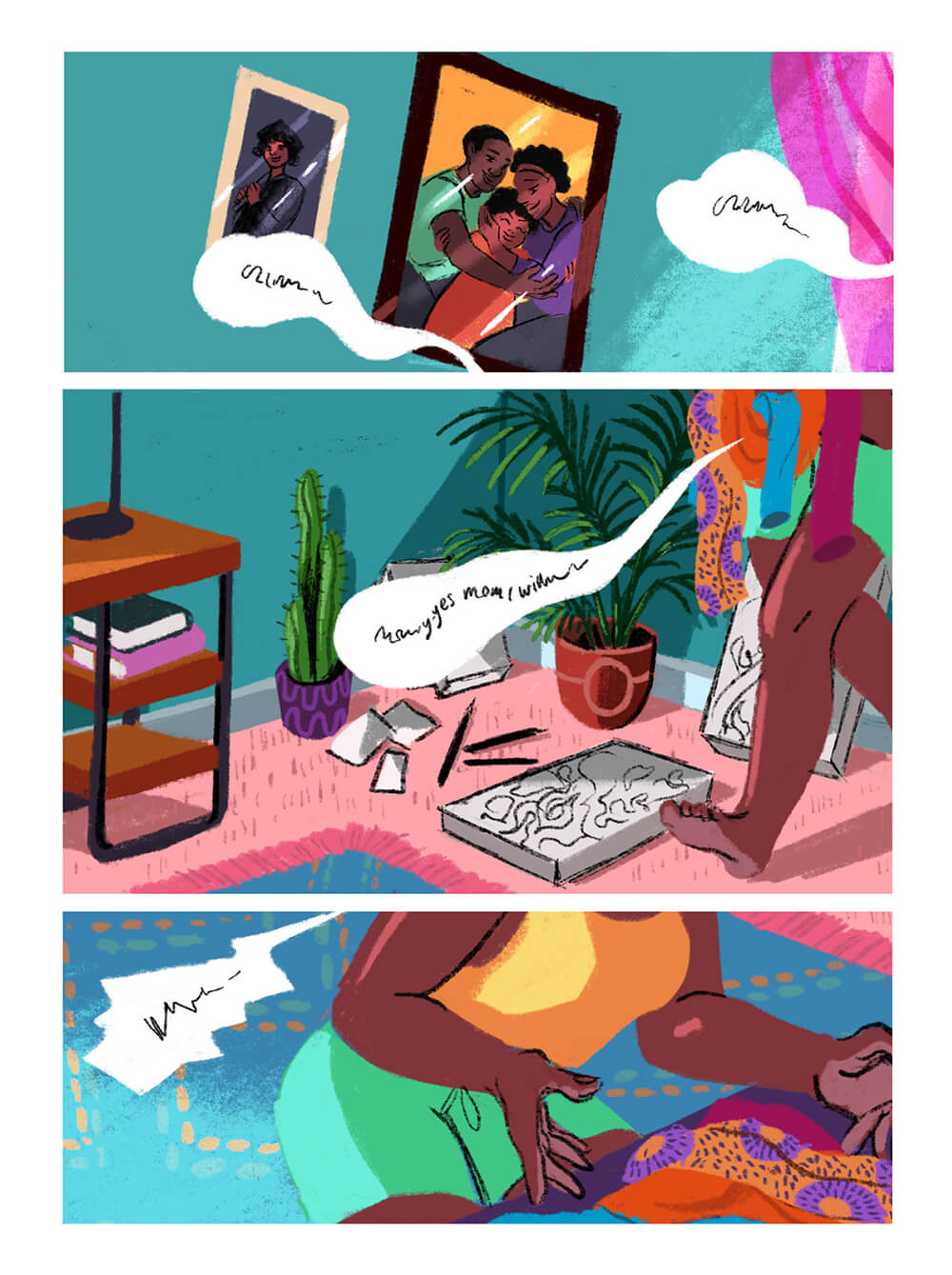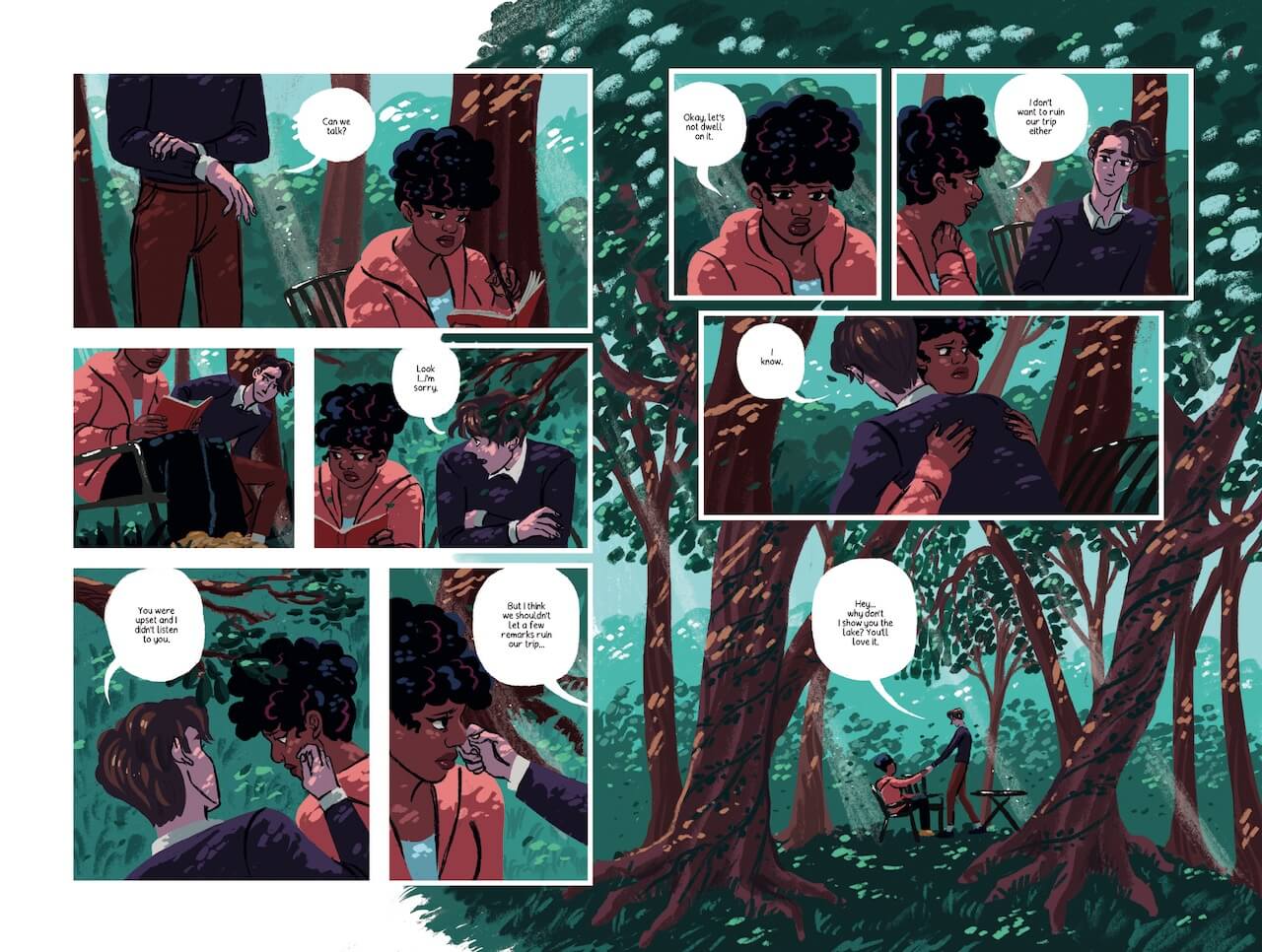In What We Don’t Talk About, Farai and Adam plan a trip to see Adam’s parents for the first time in their two-year relationship. While Farai is excited at the prospect of meeting her partner’s family, Adam is out of sorts about the trip. From the moment his parents open the door, we get an inkling as to why—Farai is about to make this privileged white family face their narrow world-view, and they’re not going to like it.
What We Don’t Talk About
Charlot Kristensen (Writer and Artist)
Avery Hill Publishing
September 9, 2020
There has been a lot of discussion about racism in the world recently, but What We Don’t Talk About shows readers that this issue is everywhere and it is insidious. When we see Black people being killed by police, it’s not an incident that comes out of nowhere. It’s been bred into non-Black communities—even in some POC—for generations. As author Charlot Kristensen points out through Farai’s inner monologue in this book, racism isn’t obvious only in slurs and murder—it’s in every facet of life.
When Adam’s parents first see Farai, they are hesitant to shake her hand—it’s the first sign of worse things to come. Adam’s mother, Martha, belittles everything ethnic about Farai—she’s stunned that Farai’s mother is an engineer and her father is a doctor. She can’t believe that they have thrived in these professions despite studying in Zimbabwe—Martha later mocks the name of the university, calling it ‘silly,’ as if she doesn’t know that that is just a plain rude thing to say.
There’s an exchange during a boating trip partway through What We Don’t Talk About that exacerbates the situation for Farai. Wearing a traditional headwrap and looking absolutely amazing, Farai and Adam join his parents for the trip when Martha decides to make a comment about the headwrap. It’s bad enough that Martha feels the need to comment about what Farai is wearing but then she asks Farai whether she’s Muslim—let’s not even start with that statement—and then expresses relief when Farai says she’s not. Followed by several comments about how Muslims are all terrorists. Unsurprisingly, Farai is infuriated at the assumption—as is the reader—but her arguments go through one ear and out the other.
What makes matters worse is the gaslighting—Martha insists that she isn’t being rude. She doesn’t even consider herself racist despite making constant assumptions about anyone who may be a minority. When Farai tries to have a conversation with Martha about how insensitive she is, Martha turns it back on Farai, insisting that it is Farai who doesn’t like her and is being deliberately hostile.
This is an all-too familiar scenario for marginalised people, and something Black activists around the world have been voicing their concerns about for decades. Kristensen deftly highlights how racist microaggressions can wear you down far more than the more recognisable acts of racist behaviour.
The hardest part of What We Don’t Talk About as a reader—and I believe the primary takeaway of this book—is that Adam refuses to stand up against his parents to fight for Farai. He is the worst kind of white ally—all talk when he is surrounded by BIPOC, but when it comes to action, he’d rather straddle the status quo to save his own hide.
When Farai brings up her concerns about Martha, Adam asks if she is reading too much into the situation or misunderstanding his mother entirely. Even when his parents’ racism plays out right in front of him, Adam just gets flustered. Instead of calling them out on it, he deflects from the issue at hand to talk about the wine they had last year or what they’re eating during their picnic. What a letdown of a human being, and sadly reminiscent of far too many people who think that having a Black person as a friend, partner, or spouse excuses them from their own racist behaviour, denying the fact that they’re throwing the whole community under the bus just to keep up appearances.
What We Don’t Talk About isn’t an easy read—my blood was boiling with every page I turned, and that is exactly the kind of reaction Kristensen means to evoke. Being at the receiving end of racism is an unbearable experience—and it happens every day for the duration of a person’s life. There’s no escape unless everyone around the world transcends their societal conditioning to discriminate and hate someone because of the colour of their skin.
Despite being set in the UK, What We Don’t Talk About is relevant to any country that is home to multiple ethnicities and has a history of discrimination against minority communities—which is almost every country. I kept thinking about how there are so many moments in this book that would resonate with the people of India even though that isn’t the target audience. Kristensen has definitely created a timely book about social racism within the microcosm of one family and has included experiences which apply to everyone.
While the reader is obviously meant to sympathise with Farai, I can imagine people out there who would see themselves in Martha’s or Adam’s shoes and just wish Farai would be quiet to keep the peace. But that’s not how the world works—silence should never have been thrust upon the marginalised just to uphold the status quo.
Look at the USA right now—the Black communities from coast to coast refuse to be silent and their protests are sparking not just deep conversations but real change. The comics community has been rocked by allegations that were hidden for decades and will hopefully bring forth the kind of change that will bring diverse voices too long silenced into the limelight. Or so we hope.
In What We Don’t Talk About, Kristensen refuses to let Farai stay silent—she speaks up, she fights for herself even when she’s on her own and she makes a tough choice when faced with the realisation that Adam would rather keep his parents happy than be on the right side of history. His loss—Farai, the Black Lives Matter protestors, POC, the people in comics who were driven out by dangerous men, and the marginalised communities of the world will continue to speak up and demand change. And we are all ready to cut out the fake supporters in our lives. One can’t help but feel a great deal when reading this book especially against the current political backdrop. But I don’t want to end this review without mentioning Kristensen’s gorgeous art and colours. I love the clean lines combined with the watercolour effect—it makes each panel more stunning to look at. She doesn’t hold back on her colour palette—there are so many glorious colours on every page of this book that contrast sharply with the subject matter. It’s a great technique to highlight the power of the story—racism doesn’t take place in a black and white scene or a dark alley. It happens during the day, on a picturesque lake, in a beautiful manor home—in places where ‘bad’ things aren’t supposed to happen.
One can’t help but feel a great deal when reading this book especially against the current political backdrop. But I don’t want to end this review without mentioning Kristensen’s gorgeous art and colours. I love the clean lines combined with the watercolour effect—it makes each panel more stunning to look at. She doesn’t hold back on her colour palette—there are so many glorious colours on every page of this book that contrast sharply with the subject matter. It’s a great technique to highlight the power of the story—racism doesn’t take place in a black and white scene or a dark alley. It happens during the day, on a picturesque lake, in a beautiful manor home—in places where ‘bad’ things aren’t supposed to happen.
What We Don’t Talk About is Kristensen’s debut graphic novel but that description belies the depth and skill involved in creating this book. Kristensen isn’t subtle about the central focus in this book and she doesn’t have to be—racism happens in more insidious ways than people realise. It’s something you see with well-intentioned, liberal folk, and loving partners. Hopefully, those are the kinds of people who will pick up this book and learn something—because they have a lot of learning to do.



